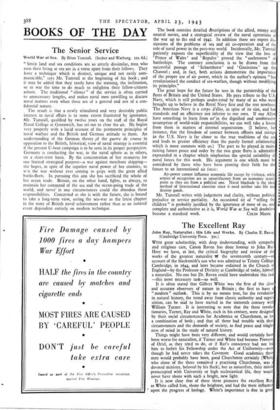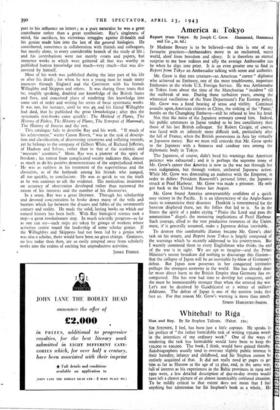The Excellent Ray
John Ray, Naturalist : His Life and Works. By Charles E. Raves (Cambridge University Press. los.)
WITH great scholarship, with deep Understanding, with sympathy and religious care, Canon Raven has done honour to John Ray. Here we have, at last, the critical biography and review of the works of the greatest naturalist !If the seventeenth century—an account of the blacksmith's son who was admitted to Trinity College, Cambridge, in 1644, and later became ordained in the Church of England—by the Professor of Divinity at Cambridge of today, himself a naturalist. No one but Dr. Raven could have 'undertaken this task —this most necessary task—so well.
It is often stated that Gilbert White was the first of the close and accurate observers of nature in Britain ; the first to have " modern " outlook. This is by no means true, for the revolution in natural history, the trend away from classic authority and super stition, can be said to have started in the sixteenth century with William Turner. It is interesting to note that the three revolu tionaries, Turner, Ray and White, each in his century, were designed by their social circumstances for Academics or Churchmen, or for a combination of both ; and that all three had trouble with their circumstances and the demands of society, to find peace and single- ness of mind in the study of natural history.
Things might have been very different, and would certainly ha been worse for naturalists, if Turner and White had become Provosts of Oriel, as they tried to do, of if Ray's conscience had not 1 him to forfeit his Fellowship under the Act of Uniformity—ev though he had never takes the Covenant Good academics th
men would probably have been, good Churchmen certainly (Whit who alone of the three remained a practising Churchman, was A
devoted minister, beloved by his flock), but as naturalists, their mind preoccupied with University or high ecclesiastical life, they would never have shone with such a bright, new light.
It is now clear that of these three pioneers the excellent Ray as White called him, shone the brightest, and had the most influen upon the progress :Df biology. White's importance is due in grea
part to his influence on letters ; as a pure naturalist he was a great contributor rather than a great synthesiser. Ray's singleness of
mind, his sacrifices, his victorious struggles against ill-health and his genius made him into the last of the general biologists. He contributed, sometimes in collaboration with friends and colleagues, but mostly alone, to every considerable branch of the study of life ; and his contributions were not merely essays and papers, but immense works in which were gathered all that was worthy in published human knowledge and much—very much—that was dis- covered by himself.
Most of his work was published during the later part of his life or after his death ; for when he was a young man he made many journeys through Englani and the Continent with his friends Willughby and Skippon and others. It was during these tours that he, roughly speaking, doubled our knowledge of the British fauna and flora, and conceived plans of rendering this knowledge into some sort of order and writing his series of basic systematic works. It was not, for instance, until he was 49, and his friend Willughby had died, that he published the great Ornithologia ; after this the systematic text-books came quickly : The Method of Plants, The History of Fishes, The History of Plants, The Synopsis of Mammals, The History of Insects and the rest.
• This catalogue fails to describe Ray and his work. " If much of his achievement," writes Canon Raven, " was in the task of descrip- tion and classification, of discovering synonyms and collating records, yet he belongs to the company of Gilbert White, of Richard Jefferies, of Hudson and Selnus, rather than to that of the academic and museum ' scientists." More, Ray was a pioneer of the spirit of freedom ; his retreat from complicated society indicates this, almost as much as do his positive demonstrations of the unprejudiced mind. He was as ruthless in his treatment of the superstitious and the classicists, as of the hotheads among his friends who jumped, all too quickly, to conclusions. He was as quick to see the truth as he was cautious to sift the evidence. His meticulous insistence on accuracy of observation developed rather than narrowed the extent of his interests and the number of his discoveries. In a sense, Ray was a great liberator. Through his scholarship and devoted concentration he broke down many of the veils and barriers which lay between the dreams and fables of the seventeenth century and reality. He made the solid, lasting books on which our natural history has been built. With Ray biological science took a step—a great revolutionary step. In much scientific progress—as far as one can see—such steps are taken by groups of workers whose activities centre round the leadership of some scholar genius. If the Willughbys and Skippons had not been led by a genius who was also a scholar, there would have been no great change. Geniuses, no less today than then, are so easily tempted away from scholarly works into the realms of exciting but unproductive activities.
JAMES FISHER.



























 Previous page
Previous page